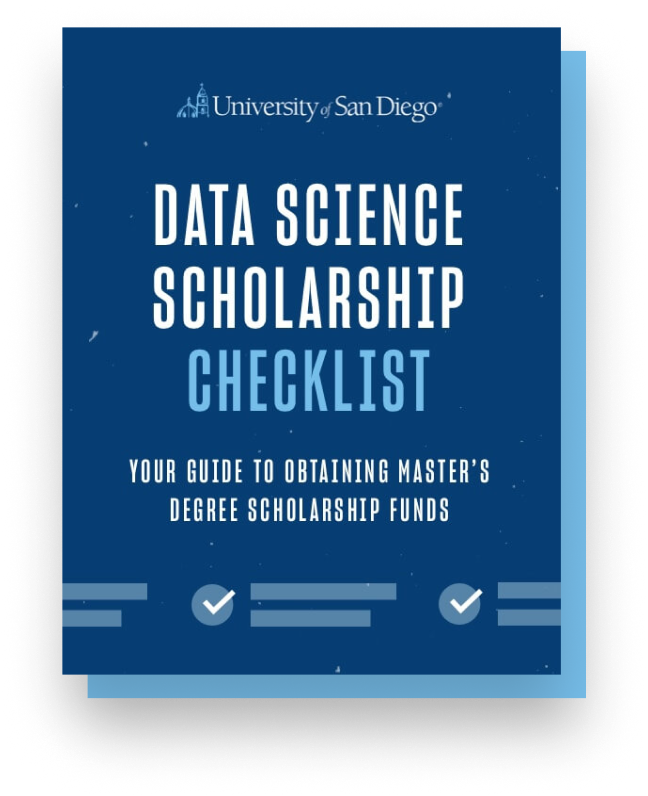If you’re interested in advancing your data analytics career, you may be considering a master’s degree — but is it worth it? Will it help your career, or should you think about a different program? How much would a degree cost? How long would it take to complete? These are all important questions to ask that we tackle in this helpful blog post. Keep reading to learn about the ROI of a master’s degree in data analytics.
Is a Master’s in Data Analytics Worth It?
It’s important to calculate the ROI of any advanced degree. Here are some helpful steps from fintech leader and loan provider Earnest:
- Determine whether an advanced degree is required for the types of positions you’re seeking. If you aren’t sure, look at job postings on LinkedIn and Indeed. Do the positions you’re interested in require advanced degrees? Or is it a preferred qualification?
- Explore the cost of attending graduate school. Add up the expenses for tuition, fees, books, etc. Compare in-person and online programs to determine which program might be a better fit for your schedule and budget.
- Compare your pre- and post-master’s degree salary. Popular job sites like Glassdoor and Monster may be able to offer additional insight.
- The final step — more math. Subtract your estimated student loan payments from your anticipated salary to help calculate your ROI (it is likely that your increased earnings will quickly offset the cost of your degree).
The average cost of a master’s degree ranges between $30,000 and $120,000, depending on whether the school is public or private, the major, length of the program, etc. Since program costs can vary wildly, it’s important to do your research.
Here are some important questions to consider:
- Can you afford student loan payments?
- Does your company offer any type of tuition reimbursement?
- Will you receive a pay increase after receiving an advanced degree?
- Will a master’s degree allow you to pursue more opportunities within your field?
- Would a master’s degree help with your overall career goals?
- Are you interested in certain positions that require a master’s degree?
What Can I Do With a Data Analytics Master’s Degree?
The answer — a lot. In fact, the position of database analyst is #9 on CNN’s list of top 100 Best Jobs in America, receiving positive reviews in terms of personal satisfaction, telecommuting, and low stress. According to The Muse, “data and analytics can also help you get your foot in the door at a variety of companies and industries.”
The reality is that there are a variety of data-centric positions in many industries that become much more accessible with a master’s degree in data analytics, including:
- Business and finance
- Information technology
- Education
- Entertainment
- Data science
- Health care
- IT systems
- Government
- Retail
- Sports
[PDF GUIDE] Considering a master’s in data science? Find funding options with our free scholarship guide.
Average Salaries with a Master’s in Data Analytics
Your salary with a master’s degree will depend on many factors, including the specific position and company, your background and experience, and where the job is located. But here’s a good number to keep in mind: Coursera estimates that a master’s degree could help you earn $15,000 more than a salary with only a bachelor’s degree.
According to Master of Business Analytics, the average salary for a data analyst position is $59,700, but an advanced degree could net you closer to $84,000, especially early in your career.
Master’s in Data Analytics vs. Master’s in Data Science
You might also consider an advanced degree in data science. Let’s examine the similarities and differences between the two fields.
- Data Analytics is defined as qualitative and quantitative techniques and processes used to improve productivity and business performance. Data is extracted in order to identify and analyze specific data and patterns through various techniques.
- Data Science is a broad field comprising the collective processes, theories, concepts, tools, and technologies that facilitate the review, analysis, and extraction of valuable knowledge and hidden information from raw data.
An analytics degree is a good choice for mid-career IT professionals or students with a computer science background who seek to focus on analytics.
A data science degree is ideal for candidates who currently work in any data-related and analytical positions — or inquisitive professionals looking to enhance their understanding of structured and unstructured data in the scope of solving real-world problems.
What Jobs Can You Get With a Master’s Degree in Data Analytics?
A master’s degree can typically help you achieve higher-level positions, and in some cases, it may be required. A recent article from The Muse explores the high demand of data professionals, and highlights eight data-related jobs to consider:
- Data Analyst
- Data Scientist
- Machine Learning Engineer
- Business Intelligence Analyst
- Logistics Analyst
- Data Architect
- Business Systems Analyst
- Marketing Analyst
Three of the jobs listed — Data Scientist, Machine Learning Engineer, and Business Intelligence Analyst — usually require or prefer a master’s degree. These positions also typically have higher salary ranges than the others listed.
Other data-related jobs found on LinkedIn include:
- Senior Data Governance Analyst
- Data Governance Analyst
- Data Mining Analyst
- Data Research Analyst
- Logistics Analyst III
- Business Data Analyst
- Data Quality Analyst
It’s important to note that the set of requirements for each data-related job posting is different. An advanced degree may be required for one job but not for a similar position at a different company.
[RELATED RESOURCE] Invest in your future. Discover scholarships to finance your master’s degree and boost your earning potential.
Companies Hiring Data Analysts
Every business and organization deals with data in some way, which means data analysts are instrumental in practically every industry. Interested in working with data in sports, retail, education, or financial firms? Good news — a recent search for “data analyst” on LinkedIn revealed more than hundreds of thousands of job postings. Here’s a quick snapshot of companies that are hiring for these types of positions:
- Fidelity Investments
- Amazon
- Harvard University
- Sony Electronics
- Doctors Without Borders
- Bank of America
- Progressive Insurance
- Microsoft
- Commonwealth of Massachusetts
- Meta
- FanDuel
- Salesforce
- The Home Depot
- St. Jude Children’s Research Hospital
- Boston Medical Center
- NFL
- Apple
- Nordstrom
Frequently Asked Questions
This report was brought to you by the online Master of Science in Applied Data Science offered by the University of San Diego, which has been developed by data science experts in collaboration with industry advisors. If you have any questions or would like more information, we encourage you to talk to a USD advisor to see how our M.S. in Applied Data Science program can help you reach your professional goals.





